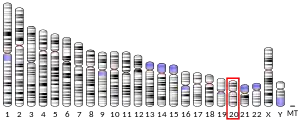Endothelin-3 is a protein that in humans is encoded by the EDN3 gene.[5]
The protein encoded by this gene is a member of the endothelin family. Endothelins are endothelium-derived vasoactive peptides involved in a variety of biological functions. The active form of this protein is a 21 amino acid peptide processed from the precursor protein. The active peptide is a ligand for endothelin receptor type B (EDNRB). The interaction of this endothelin with EDNRB is essential for development of neural crest-derived cell lineages, such as melanocytes and enteric neurons. Mutations in this gene and EDNRB have been associated with Hirschsprung disease (HSCR) and Waardenburg syndrome (WS), which are congenital disorders involving neural crest-derived cells. Four alternatively spliced transcript variants encoding three distinct isoforms have been observed.[5]
References
- 1 2 3 GRCh38: Ensembl release 89: ENSG00000124205 - Ensembl, May 2017
- 1 2 3 GRCm38: Ensembl release 89: ENSMUSG00000027524 - Ensembl, May 2017
- ↑ "Human PubMed Reference:". National Center for Biotechnology Information, U.S. National Library of Medicine.
- ↑ "Mouse PubMed Reference:". National Center for Biotechnology Information, U.S. National Library of Medicine.
- 1 2 "Entrez Gene: EDN3 endothelin 3".
Further reading
- Calderone RA (1994). "Molecular interactions at the interface of Candida albicans and host cells". Arch. Med. Res. 24 (3): 275–9. PMID 8298278.
- Hofstra RM, Osinga J, Buys CH (1998). "Mutations in Hirschsprung disease: when does a mutation contribute to the phenotype". Eur. J. Hum. Genet. 5 (4): 180–5. doi:10.1159/000484760. PMID 9359036.
- Parisi MA, Kapur RP (2001). "Genetics of Hirschsprung disease". Curr. Opin. Pediatr. 12 (6): 610–7. doi:10.1097/00008480-200012000-00017. PMID 11106284. S2CID 12573027.
- O'Reilly G, Charnock-Jones DS, Davenport AP, et al. (1993). "Presence of messenger ribonucleic acid for endothelin-1, endothelin-2, and endothelin-3 in human endometrium and a change in the ratio of ETA and ETB receptor subtype across the menstrual cycle". J. Clin. Endocrinol. Metab. 75 (6): 1545–9. doi:10.1210/jcem.75.6.1464662. PMID 1464662.
- Mills RG, O'Donoghue SI, Smith R, King GF (1992). "Solution structure of endothelin-3 determined using NMR spectroscopy". Biochemistry. 31 (24): 5640–5. doi:10.1021/bi00139a030. PMID 1610811.
- Rao VV, Löffler C, Hansmann I (1991). "The gene for the novel vasoactive peptide endothelin 3 (EDN3) is localized to human chromosome 20q13.2-qter". Genomics. 10 (3): 840–1. doi:10.1016/0888-7543(91)90472-Q. PMID 1889823.
- Arinami T, Ishikawa M, Inoue A, et al. (1991). "Chromosomal assignments of the human endothelin family genes: the endothelin-1 gene (EDN1) to 6p23-p24, the endothelin-2 gene (EDN2) to 1p34, and the endothelin-3 gene (EDN3) to 20q13.2-q13.3". Am. J. Hum. Genet. 48 (5): 990–6. PMC 1683044. PMID 2018043.
- Onda H, Ohkubo S, Ogi K, et al. (1990). "One of the endothelin gene family, endothelin 3 gene, is expressed in the placenta". FEBS Lett. 261 (2): 327–30. doi:10.1016/0014-5793(90)80583-5. PMID 2178974. S2CID 37516374.
- Lees WE, Kalinka S, Meech J, et al. (1990). "Generation of human endothelin by cathepsin E.". FEBS Lett. 273 (1–2): 99–102. doi:10.1016/0014-5793(90)81060-2. PMID 2226872. S2CID 43466635.
- Bloch KD, Eddy RL, Shows TB, Quertermous T (1989). "cDNA cloning and chromosomal assignment of the gene encoding endothelin 3". J. Biol. Chem. 264 (30): 18156–61. doi:10.1016/S0021-9258(19)84690-2. PMID 2509452.
- Inoue A, Yanagisawa M, Kimura S, et al. (1989). "The human endothelin family: three structurally and pharmacologically distinct isopeptides predicted by three separate genes". Proc. Natl. Acad. Sci. U.S.A. 86 (8): 2863–7. Bibcode:1989PNAS...86.2863I. doi:10.1073/pnas.86.8.2863. PMC 287019. PMID 2649896.
- Yu JC, Davenport AP (1995). "Secretion of endothelin-1 and endothelin-3 by human cultured vascular smooth muscle cells". Br. J. Pharmacol. 114 (2): 551–7. doi:10.1111/j.1476-5381.1995.tb13262.x. PMC 1510231. PMID 7881755.
- Baynash AG, Hosoda K, Giaid A, et al. (1995). "Interaction of endothelin-3 with endothelin-B receptor is essential for development of epidermal melanocytes and enteric neurons". Cell. 79 (7): 1277–85. doi:10.1016/0092-8674(94)90018-3. PMID 8001160. S2CID 32577813.
- Edery P, Attié T, Amiel J, et al. (1996). "Mutation of the endothelin-3 gene in the Waardenburg-Hirschsprung disease (Shah-Waardenburg syndrome)". Nat. Genet. 12 (4): 442–4. doi:10.1038/ng0496-442. PMID 8630502. S2CID 19637835.
- Hofstra RM, Osinga J, Tan-Sindhunata G, et al. (1996). "A homozygous mutation in the endothelin-3 gene associated with a combined Waardenburg type 2 and Hirschsprung phenotype (Shah-Waardenburg syndrome)". Nat. Genet. 12 (4): 445–7. doi:10.1038/ng0496-445. hdl:1765/54507. PMID 8630503. S2CID 935271.
- Lahav R, Ziller C, Dupin E, Le Douarin NM (1996). "Endothelin 3 promotes neural crest cell proliferation and mediates a vast increase in melanocyte number in culture". Proc. Natl. Acad. Sci. U.S.A. 93 (9): 3892–7. Bibcode:1996PNAS...93.3892L. doi:10.1073/pnas.93.9.3892. PMC 39455. PMID 8632985.
- Bolk S, Angrist M, Xie J, et al. (1996). "Endothelin-3 frameshift mutation in congenital central hypoventilation syndrome". Nat. Genet. 13 (4): 395–6. doi:10.1038/ng0896-395. PMID 8696331. S2CID 1129547.
- Nakano A, Kishi F, Minami K, et al. (1997). "Selective conversion of big endothelins to tracheal smooth muscle-constricting 31-amino acid-length endothelins by chymase from human mast cells". J. Immunol. 159 (4): 1987–92. doi:10.4049/jimmunol.159.4.1987. PMID 9257865.
- Bourgeois C, Robert B, Rebourcet R, et al. (1997). "Endothelin-1 and ETA receptor expression in vascular smooth muscle cells from human placenta: a new ETA receptor messenger ribonucleic acid is generated by alternative splicing of exon 3". J. Clin. Endocrinol. Metab. 82 (9): 3116–23. doi:10.1210/jcem.82.9.4209. PMID 9284755.
- Wiesmann F, Veeck J, Galm O, et al. (2009). "Frequent loss of endothelin-3 (EDN3) expression due to epigenetic inactivation in human breast cancer". Breast Cancer Res. 11 (3): R34. doi:10.1186/bcr2319. PMC 2716502. PMID 19527488.





